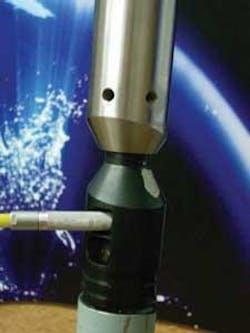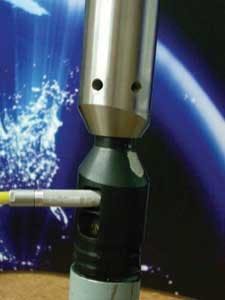DRILLING & PRODUCTION
Frank Hartley • Houston
New cement seals microleaks
Schlumberger says it has developed its FUTUR active set-cement technology that automatically seals microleaks in a cement sheath.
Pumped and placed as part of any primary cementing operation, the active components of this cement system remain dormant until exposed to hydrocarbons, such as those seeping through cracks or microannulae in the cement sheath. Upon activation by contact with hydrocarbons, this cement sheath will self-repair without intervention. This prevents the annular migration of fluids behind the casing between zones or the sustained casing pressure (SCP) at surface.
“FUTUR cement system represents a major technological breakthrough that solves several vexing problems that have impacted the industry for some time,” says Belgacem Chariag, president of Well Services, Schlumberger. “In underground gas storage wells in Germany and Italy, the technology had a double benefit. In addition to preventing annular pressure buildup, the technology sealed against gas leaks into depleted zones that would have resulted in significant financial losses for the well owners over time.”
This new technology can be mixed and pumped as a lead or tail system during any primary cement job. The properties of this system are comparable to those of conventional cements meaning it can be pumped with standard cementing equipment. No additional equipment or personnel are required.
Once in place, this technology guards against hydrocarbon leakage and extends the life of the well. Even microscale leaks caused by subsidence, pressure/temperature cycling, or tectonic activity will be sealed. The reaction within the matrix to the exposure to hydrocarbons is spontaneous and rapid. The system retains its reactivity over time, and will continue to seal any subsequent leaks that may occur over the well’s productive life, or even after abandonment.
Particle Drilling Technologies completes first phase of test
Particle Drilling Technologies Inc. says it has completed the first phase of its in-house test program of the new particle injection system with good results. The testing confirmed that the automated system operates as designed as a mechanical means to continuously inject particles into drilling fluid at the rates needed for commercial use. The next phase of this test program will focus on endurance testing, including testing under variable conditions to refine processes and procedures for operating and maintaining this new equipment.
In prior field tests, the hydraulic particle injection system had difficulty maintaining a continuous flow of particles to the drill bit under high, fluctuating well pressures. The extruder based particle injection system relies upon a volumetric feeder and is unaffected by well pressure, which will substantially improve performance and broaden the operating range.
“After having tested several prototype injection concepts, the new ‘extruder-based’ particle injection system was engineered, designed, and fully assembled during the last four months,” says Jim Terry, president and CEO of Particle Drilling Technologies. “The equipment has been designed such that it has complete and integral operational redundancy built for and complies with oilfield standards for operational integrity and safety. Now that we have had an opportunity to test the essential elements, we have begun planning the next commercial trial and are very excited about taking the next step towards commercializing particle impact drilling. I credit our engineering and operations team for the successful particle injection development. Their focus, talent and hard work allowed us to accomplish another significant milestone in the advancement of this exciting technology.”
Impact Guidance Systems develops DataCoil
Impact Guidance Systems, a research and development company based in Spring, Texas, has released its latest sensor technology for coiled tubing applications.
The system, known as DataCoil, is a state-of-the-art memory sensor that combines multiple sensors into a compact module. The module accompanies the bottomhole assembly (BHA) and monitors parameters such as pressure, temperature, inclination, compression, and tensile and impact loads.
The system recently was deployed for an operator in Alaska, where it was subjected to 24,000 impacts greater than 10,000 lb each over a 30-minute interval during a high-profile fishing operation. During vibratory impacting, the tool continued to acquire pressure, temperature, and strain data without interruption. The tool has been used on over a dozen wells for various applications since.
This system can be deployed “in field” for extended periods on a single battery charge, typically over six months.
The system can be applied in perforating, fracturing, MLT target entry, inflatable packer setting, bridge / plug setting / retrieval, heavy duty fishing operations, milling operation, vibratory hammers, hydraulic single shot hammers, tractor deployment / measurement, and sliding sleeve manipulation and confirmation.
The system supplies information and data as follows:
- Data analysis of coil tubing loads
- Surface tensile versus BHA loading
- Surface applied pressure versus actual BHA pressures
- Actual BHA inclination for friction analysis
- Actual forces applied during impacting with the ability to monitor change with pressure analysis
- Accurate MLT entry with inclination sensor can be combined with pressure analysis.
The system fills the gap between basic coil operations, where downhole digital data analysis is limited, and real-time coil tubing runs. Also, sensor for sensor, it is a low-cost system that can be used in virtually any coiled tubing BHA.
PCM develops PCM VulcainT
The industry’s first all-metal progressing cavity pump, the PCM VulcainT used recently offshore Congo, withstands the extreme downhole temperatures of thermal oil recovery.
PCM, manufacturer of positive displacement pumps, says it developed the PCM VulcainT, a progressing cavity pump with an all-metal design capable of pumping extremely hot (350° C/660° F) and extremely viscous fluids. One case is offshore Congo, on a low water producing platform (3,000 b/d or 477 cu m/d).
It is estimated that half of the world’s known oil reserves are of unconventional oil, ranging from viscous heavy oil to solid bitumen.

